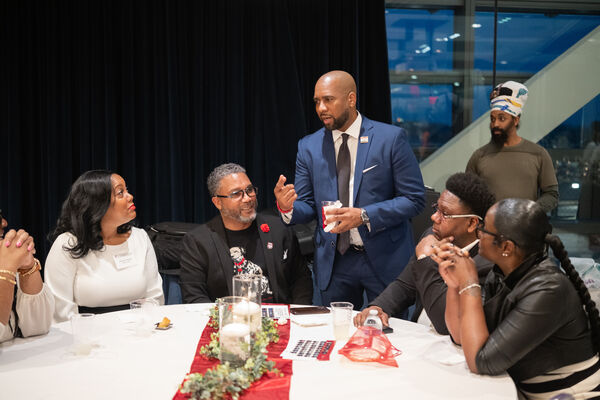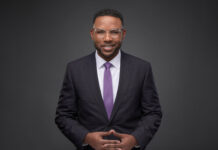From cyberbullying to hate speech, the negative impacts of digital interactions have real-world consequences, often escalating to physical violence. There’s another form of violence that gets less attention though it is equally destructive: economic violence—a cycle of poverty that affects many formerly incarcerated individuals.
Patrick M. Young, founder of 4 Social Peace and author of the ebook “A Way Up: Economic Development Post Incarceration” (Page Publishing, January 21, 2022), has dedicated his life to tackling these interconnected issues. His innovative nonprofit addresses both digital community violence and economic disenfranchisement, providing solutions that empower marginalized individuals while creating safer, more supportive communities online and offline. For business leaders, Young’s approach offers a unique opportunity to invest in economic empowerment, workforce reintegration, and social good.
TNJ.com contributor Taroue Brooks explores Young’s visioin through his book and his practical work.
An economic imperative
In “A Way Up,” Young sees poverty as the root cause of much crime. Individuals returning from incarceration often face overwhelming financial barriers, from lack of housing to crippling debt, while being expected to reintegrate into society. Without the proper tools, many fall back into the cycle of poverty and crime that led to their initial incarceration. Such economic disenfranchisement keeps individuals trapped in systems of poverty, unable to escape due to a lack of financial literacy and support networks, Young contends.
Young draws from personal experiences and lessons learned from the military’s Office of Transition and Economic Development—a model Young believes can be applied to formerly incarcerated individuals. In the military, service members are required to complete economic development courses before their discharge. These courses teach essential skills, such as financial management, credit building, and job seeking tools that help veterans successfully transition into civilian life.
“We need the same type of mandatory financial literacy programs for people returning from incarceration,” Young insists. His book offers practical strategies for achieving financial stability and success.
The approach makes economic sense for business leaders, he says. By investing in the economic development of formerly incarcerated individuals, businesses can tap into an underutilized workforce while reducing the societal costs of recidivism and crime.
A bridge to economic empowerment and workforce readiness
“A Way Up” is rooted in Young’s personal journey from incarceration to community leader and advocate. In his strategies for increasing financial literacy, achieving economic stability, and creating generational wealth, he cites three key components:
Education and skill development. Continuous learning to unlock better job opportunities and economic independence.
Community and mentorship: Building supportive networks that provide guidance, both financially and personally, after incarceration.
Policy Advocacy: Pushing for systemic change at the policy level, including fair hiring practices and access to resources that help formerly incarcerated individuals integrate back into society.
The narrative of “A Way Up” coincides with heightened concerns in the US around mass incarceration, poverty, and the challenges of workforce reintegration. The business world, too, is grappling with its own challenges: talent shortages, diversity and inclusion, and corporate social responsibility. Young offers a way for business leaders to not only improve society, but also drive economic growth and workforce innovation.
The mission of 4 Social Peace
Young’s nonprofit, 4 Social Peace, is the practical extension of his vision, addressing both digital violence and economic development for formerly incarcerated individuals. With the rise of online harassment, cyberbullying, and hate speech, digital spaces have become flashpoints for conflict. 4 Social Peace developed the PeaceGuard initiative, deploying trained “digital peacekeepers” to monitor and de-escalate online tensions before they spiral into real-world violence.
The digital safety component of Young’s work is particularly relevant for business owners. As companies expand into digital platforms, ensuring safe online environments is critical to protecting brand integrity and fostering inclusive digital communities. Businesses with a social-impact focus can benefit from supporting initiatives like 4 Social Peace that promote digital literacy, responsible social media use, and conflict resolution—all vital for maintaining a healthy online ecosystem.
Moreover, 4 Social Peace’s economic development programs’ emphasis on equipping formerly incarcerated individuals with essential skills and financial know-how align with corporate dedication to diversity, equity, and inclusion (DEI)–even in the face of anti-DEI pressures—in expandind their social impact and addressing labor shortages.
More critical now than ever
Black self-help and education proponent Booker T. Washington once said, “Success is to be measured not so much by the position that one has reached in life as by the obstacles which he has overcome.” For the thousandsf of formerly incarcerated individuals in the US, too many of them Black, the greatest obstacle to social reintegration is often poverty. Young’s work seeks to remove that barrier by providing them with the tools they need for a brighter future.
At a time when social responsibility and workforce readiness are key concerns for businesses, Young’s message is clear: economic empowerment and digital peace are interconnected, and tackling these issues at their root benefits not only marginalized individuals, but also the broader economy. For businesses, the opportunity to engage in initiatives like 4 Social Peace offers a way to fulfill corporate social responsibility goals, while creating pathways for untapped talent to enter the workforce.
Young’s solutions, therefore, are not just about social good—they also make good business sense. Companies that support financial literacy programs for formerly incarcerated individuals, or invest in digital safety initiatives, contribute to a more inclusive economy and safer digital environments.
NOTE: The above article relied in part on the following references:
“Breaking the Chains of Poverty: The Role of Economic Empowerment Post-Incarceration.” The Atlantic, 2023.
“The Military’s Model for Economic Transition: Lessons for Civilian Reentry.” Pew Research Center, 2022.
“Poverty and Crime: “Poverty and Crime: The Unseen Connection.” Harvard Business Review, 2021.
“The Link Between Financial Literacy and Reduced Recidivism.” The Guardian, 2020.
“Digital Violence: Why Online Aggression Leads to Real-World Tragedies.” Journal of Public Safety, 2023.








